by Rita Leydon ©1998
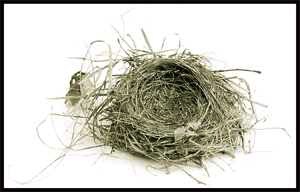
This feels like a long story, but in reality it only took two and a half weeks. I was rewriting a story I first wrote six months ago. It had aged and settled while I had acquired some distance and perspective. Pecking the keyboard and staring into space consumed much of my time. One day I noticed a bird landing and flying off repeatedly outside the window in my studio. I didn’t wonder about it—just noticed.
The next day, a Tuesday, the bird was back and I rather liked having a busy companion in my peripheral vision. It was a robin and I thought of it as a “he.” Still, I didn’t get out of my seat to commune.
On Wednesday I was up early stretching and yawning by the window. There was a nest under construction on the sill, tucked neatly into the corner by the crumbling chimney and somewhat hidden by the lush foliage of an ambitious wisteria vine. Robin was a girl! I was thrilled and gushed to Chris about my new friend. He smiled that vacant smile that comes when the freeways of the mind are thoroughly congested. I didn’t mind for I knew Robin would be busy for a while and Chris would hear me better another day. It didn’t matter.
I became as engrossed in Robin’s work as in my own and went over to the window often to check her progress. She selected coarse dry grasses to rough out the shape of her nest, arranging her materials with elegant abandon in a mainly circular form. Finer grasses lined the inner curvature, woven precisely, just so. I’ve done a bit of weaving myself over the years, so the mastery of interlacing was not wasted on me. If I stood very still, Robin couldn’t see me as I watched.
Thursday. We were at work bright and early, toiling in parallel. She was lining the nest with lovely squishy mud, the kind that feels sooo good between your toes, packing and smoothing it to perfection. It was plain to see that Robin was an expert nest builder. Instinct and a million years of collective experience by her forebears culminating in a perfect expression of nurturing and continuity on my window sill. I had never seen anything like this before and was very pleased with my splendid front row seat. I knew this was special in the same way as when we grew monarch butterflies on the kitchen table from black, white and yellow striped caterpillars when my boys were small. Fresh milkweed leaves in one end and little pellets plopping out the other. Such intimate observation bestows a keen sense of humble respect for the natural world.
Friday was a struggle. Stalled and frustrated by words I couldn’t find, I concentrated instead on Robin’s work. I sat by the window in my rocking chair and watched. Every ten or fifteen minutes she returned with a load of dry, short, fine grass. Nothing green, just straw. She wove this stuff into a soft, smooth and absorbent lining. Sometimes Robin would catch my movements behind the glass and startle into flight, but she always came back after a moment. I advised Chris that she was in the interior design phase of construction.
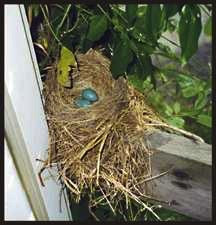
On Saturday morning there was one turquoise egg in the nest. On Sunday there were two. Everyone within earshot knew about the activities on my window sill.
The week that followed was quiet. Robin sat on her eggs when she felt like it, and was gone when she didn’t. My ducks were starting to line up nicely. It’s easy to start a story—get something on paper—but something altogether different to give it life and pulse. Creative labor, born of passion, takes real time and real agony. Robin’s labor didn’t look like work, it looked like sitting. I was a little jealous.
A full week went by. Nothing happened. I worked myself into a frothy lather of anticipation. Like the night before Christmas when I was a child—rustling papers and unusual noises stirring up a most yummy soup, tasting of dreams, fantasies and magic. Frequent
peeking didn't move things along appreciably. The gestating beings in the turquoise baubles behind the wisteria were biding their time.
All of a sudden, in the early afternoon of the second Sunday, two naked beings occupied the nest. I was surprised how surprised I was. I raced around finding my family and brought them up, one by one, to the studio for a look-see. All three were suitably wide eyed and encouraged me to thoroughly bask in my immoderate and doting childish wonder.
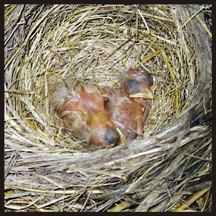
First thing Monday morning, I checked my babies. Two little scrawny bodies snuggled together, breath and pulse in rhythmic syncopation. The nest’s bowl shape kept the little guys rolled into a ball, assuring heat retention while Mom was away on errands. Nature is so smart.
Mindful that one learns the most by looking and listening, rather than meddling and prodding, I devoted extra time to my rocking observation chair—it hadn’t seen this much action since I was a nursing mother on 24 hour duty. Robin was working full time, either sitting on her brood or flying off in search of fodder. She provided cut up pieces of worm. Probably the same recipe her mother used. She knew exactly what her kids required, and she saw to it that they got it. Nature is like that.
Tuesday. My eager little chicklets manifested impatience and great vigor. Gaping beaks stretched wide to reveal a clear path to bottomless pits. A delicate little valve in the throat pulsed open and closed. Vital survival lessons like “Fear 101” hadn’t come up yet, so they weren’t afraid when I leaned over them for frequent eyeball scrutiny. Their undeveloped eyes were large dark bulges under thin transparent skin. Little downy tufts were forming here and there, notably on top of the heads and along the wing edges and tail. But the most distinctive feature was the gaping mouths. Otherwise it was sleep that occupied them.
Wednesday was more of the same, as was Thursday. The birdlings were growing beautifully in spite of my nosy lurkings. Their tummies were always full. The squirming and adjusting for comfort and attention increased and became almost frantic. No doubt Robin would be bringing home whole worms soon.
Sometimes when everything is going along swimmingly and all systems are go, the furthest thought from your mind is disaster. Certainly I was looking into the future. The little birds would mature and fly out of the nest in short order. My own fledglings are on the verge of solo flights, although both have returned to the nest for the summer. No, I was poised for growth, full steam ahead, not looking backwards or sideways, only straight ahead, exhaust drifting decidedly aft from my stack.
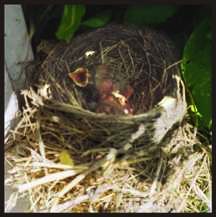
Noon-time Friday. Chris and I went for our customary walk to the village to pick up the mail and enjoy a cup of coffee together. My plan was to wrestle words all afternoon. I was close to finalizing my story. I arrived back at the studio engrossed in my thoughts and didn’t even glance at the babies. By mid afternoon I thought to look in on them.
There was no nest. There were no babies. Gone. A few stray remnants of straw clung to the sill. A mud spot was all that remained. I couldn’t register right away what had happened, I only knew that something was dreadfully wrong. My mind flashed recollections of barn cats from the past who moved their kittens if we happened to find them. Picked those young ones up by the scruff of their necks and relocated them in a new secret place away from nosy humans. This was a game we played called hide and seek.
But birds don’t do that, do they? I flung open the window and willed myself to look down, terrified what I might see. Robin’s nest was upside down among dry leaves in a cellar window well two stories below. I took the stairs four at a time and ran through the kitchen—all the while calculating that I have to get the babies back into the nest and glue them back on the sill. Remember not to touch them. The mother will reject the human scent. Certain death. I grabbed gloves in the mud room.
The ground moisture, cold and unpleasant, wicks through the knees of my corduroy pants. I reach down and retrieve my nest. It isn’t damaged, just empty. Empty! Where are the babies? I can’t believe the horror of this moment. The babies must be here. Why don’t I see them? Where are they? I scan the dry leaves over and over. There. There, lying on its side, is a little yellow corpse. Not moving. Not breathing. I pause to let the scene filter in and form some semblance of comprehension. Take it in. I scoop up the corpse. The little guy fits perfectly into my cupped hand. Limp and soft. I can see right through its skin. Veins, eyes, intestines. The stomach is huge. The little legs and feet are perfect. Death is perfect. Downy tufts give it a comical look. The beak is closed. The eyes never opened. It is thoroughly dead. I can’t find the sibling. I search over and over. No sibling. I feel sick and impotent. I pick up the nest with my other hand and walk heavily into Chris’ workshop. He sees me coming. I stick out my lower lip in the universal sign of misery, and hold out my hands to display my utter sadness. Chris extends his lower lip in sympathetic solidarity.
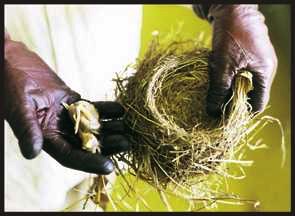
"Please take a picture," I implore him.
"Why?"
"Please, just take a picture, I want it." He does. I’m appeased and wander off with my dead baby. I put the nest in the kitchen, thinking I’ll send it to an estranged friend, a bird-man, who is into sticks and stones. The bird I bury in a flower bed next to where it fell. One deep push of the trowel and in it goes. Cover it up. That’s that.
Only a few minutes have passed. One moment there was two healthy birdlings in a nest on the window sill by my rocking chair, and the next moment, there were none.
Robin did everything right. Still the nest fell. There was no ill wind. The sun was shining. The house didn’t shake. I don’t understand why the nest fell. But it did and both babies died. The leaves they fell onto were soft. The impact couldn’t have been particularly harsh. No splat or splash. Did our dog Sirius find a tasty morsel and nibble it up before I got there? Is that why I only found one?
That afternoon, Robin flew off and came back repeatedly. Worm bits in her beak. She’d land, walk over to where her family ought to be, look around confused, then fly off. A few moments later she was back and repeated the walk. Again and again, on into the night.
The next day—Friday—I was feverishly trying to finalize my story. Needing a word halfway between “willing” and “resigned,” I settled into the rocker by the window with my thesaurus to find a good word. There on the sill sat Robin. Beak empty. My movements hadn’t startled her. Her mind was somewhere else. Staring blankly out towards the barn across the way, seemingly at a loss for what to do next. I looked at her, closed my eyes and wept. I’m a mother too.

